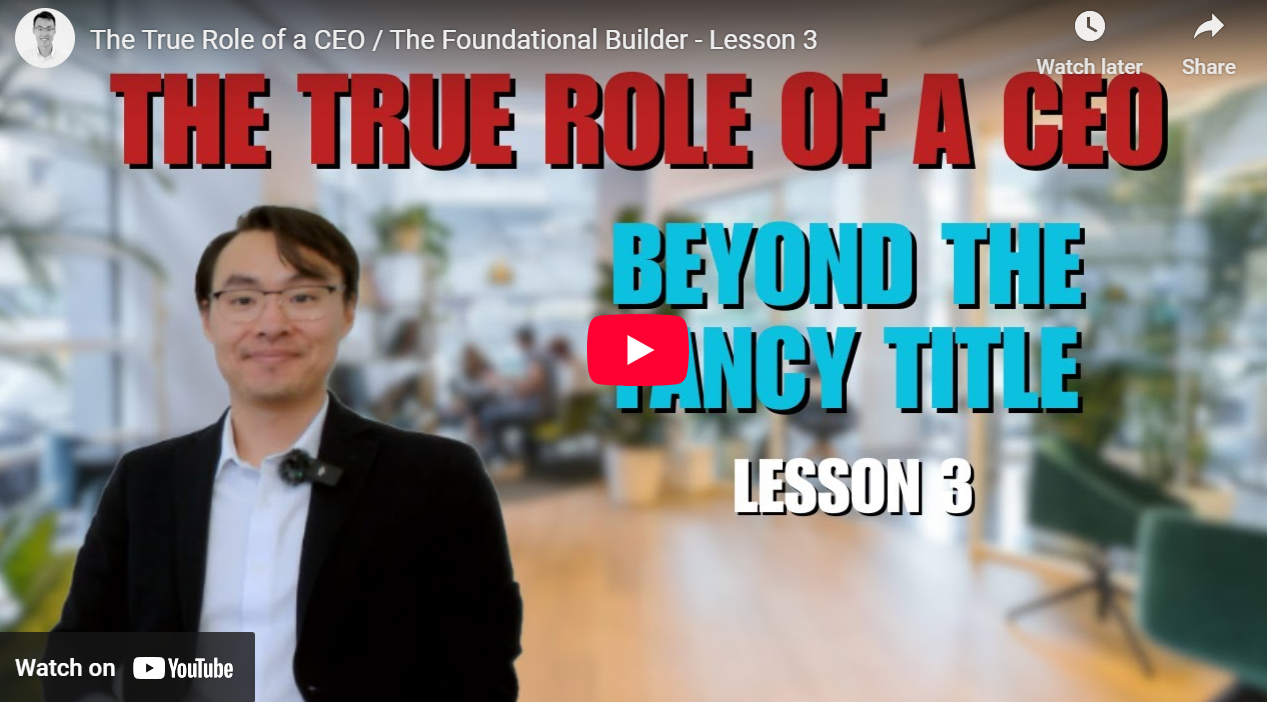The Foundation Builder – Your First $100k Free Course
We highly recommend downloading and reading the two complimentary e-books to maximize your learning experience in the class.
Module 1 - Lesson 2 Recap
In Lesson 2, we distinguished between the "Operator" and "Strategic Owner" roles. We highlighted the importance of adopting a Strategic Owner mindset from day one to build a sustainable business, rather than just a demanding job. The "Arrival Fallacy" and the case of the two designers illustrated this crucial difference.
You were prompted to use the "Operator vs. Strategic Owner Self-Assessment."
Let's get started!
Lesson 3: Your True Role as CEO – Core Strategic Responsibilities
Even if you're currently a solo entrepreneur, wearing all the hats, it's vital to understand the true responsibilities of a CEO (Chief Executive Officer) in any business, big or small. This isn't just about a fancy title; it's about a specific set of strategic functions that drive the business forward. As you aim for your first $100k, consciously dedicating time to these CEO-level activities is paramount.
1
Setting the Vision & Strategy
2
What it means:
This is about defining where the business is going (your $100k vision and beyond) and the overall plan to get there. What market are you serving? What makes you different? What are your key goals for the next year, quarter, or month?
Why it's crucial for $100k:
Without a clear vision and strategy, your efforts will be scattered. You'll chase shiny objects or react to daily fires instead of proactively building towards your goal. A clear strategy helps you say "no" to distractions and "yes" to the right opportunities.
Operator Trap: Getting so bogged down in daily tasks that there's no time to think strategically about the future.
Validating the Concept & Achieving Initial Traction (MVP & Early Sales)
3
What it means:
Before you invest heavily in a full-scale operation or team, you must prove that people actually want what you're offering and are willing to pay for it. This is the Minimum Viable Product (MVP) stage. It’s about getting a basic version of your product or service into the hands of real customers quickly to learn and iterate.
Why it's crucial for $100k:
This step de-risks your venture. Spending significant time and money building something nobody wants is a fast track to failure. Early sales, even small ones, provide proof of concept, invaluable feedback, and initial cash flow.
Business Case Example (The Bakery Pilot):
Instead of immediately signing a lease, buying expensive equipment, and hiring staff for a full bakery, a budding baker might start by baking a few types of bread at home (their MVP). Their first goal? Sell 100 loaves to family and friends. Then, ask those happy customers for referrals and try to sell another 100 loaves to this new circle. This low-cost pilot allows them to test recipes (product quality), gauge demand, experiment with price points, and get direct customer feedback. If they can't sell bread this way, a full bakery is unlikely to succeed. If they do, they've validated their concept and built initial momentum.
What People Don't Tell You:
Don't be afraid to "do things that don't scale" in this phase (a famous piece of advice from Y Combinator). Hand-deliver orders, have personal conversations with every early customer, manually track things. The goal here is learning and validation, not perfect efficiency. This is also where your passion is truly tested – can you push through the uncertainty and hustle to get those first sales?
Operator Trap: Spending months or years perfecting a product in isolation without getting real-world feedback or trying to make a sale, only to launch to crickets. Or, conversely, scaling too quickly before the product/market fit is truly validated.
Driving Growth & Innovation (Marketing & Sales Strategy Beyond MVP)
4
What it means:
Once your MVP has shown promise, the CEO focuses on developing scalable marketing and sales strategies. While you might still be doing much of the execution, you're thinking strategically: Are your marketing efforts reaching the right customers efficiently? Is your sales process converting consistently? How can you innovate your offerings or reach new market segments?
Why it's crucial for $100k:
This is the engine that takes you from those first few sales to a consistent revenue stream. A strategic approach ensures you're not just busy with marketing activities, but productively acquiring customers who are a good fit for your business.
Operator Trap: Continuing with ad-hoc marketing without a clear strategy, not tracking results, or getting stuck in a sales process that worked for the first 10 customers but won't work for the next 100.
Ensuring Financial Health & Resource Allocation
5
What it means:
Initially, this means leading yourself effectively – managing your time, energy, and focus. As your validated concept grows and you have consistent revenue, it means identifying what tasks can be delegated (even to freelancers or VAs initially) to free you up for more strategic work, and eventually hiring and nurturing employees. It's about creating a culture, even if it's just your own work culture, that supports growth.
Why it's crucial for $100k (and beyond):
You cannot do everything yourself forever if you want to significantly grow and maintain your sanity. Learning to identify what can be handed off, and how to do that effectively, starts with understanding which parts of your validated business model are ready for leverage.
Operator Trap: Ignoring the financials until there's a crisis, or making spending decisions based on gut feeling rather than data from your MVP phase and beyond.
Building & Leading the "Team" (Even if it's just you, or future you + contractors)
6
What it means:
Understanding your numbers (which we'll cover in Module 3), making smart decisions about where to invest your limited time and money (especially profits from early sales), ensuring the business is profitable, and managing cash flow.
Why it's crucial for $100k:
You can hit $100k in revenue and still be broke if you don't manage your finances wisely. Knowing your numbers allows you to price correctly, control costs, and make investments that fuel sustainable growth.
Operator Trap: Believing "no one can do it as well as I can," leading to an unwillingness to delegate even when the business is proven and ready for help, thus becoming a permanent bottleneck.
Representing the Business & Building Key Relationships
7
What it means:
Being the face and voice of your brand. Networking, building relationships with key partners, suppliers, or even influential customers based on the success and learnings from your MVP.
Why it's crucial for $100k:
These relationships can lead to new opportunities, collaborations, and insights that you wouldn't find if you were solely focused inward on operational tasks.
Operator Trap: Being too busy with internal tasks to engage with the outside world and build a supportive network that can accelerate growth
Action Step:
This week, consciously categorize your tasks. At the end of each day, ask yourself: "How much of my time was spent on 'Operator' tasks, and how much on these 'CEO-level Strategic Responsibilities' (including MVP testing if you're at that stage)?" This awareness is the first step to shifting your focus.

Contact
achan@eightfoldcoach.com




